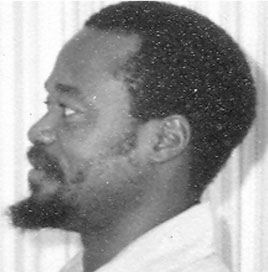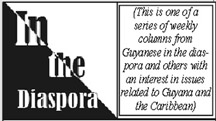Charlene Wilkinson is a lecturer in the Department of Language and Cultural Studies at the University of Guyana and a founder member of the Guyanese Languages Unit.
Wordsworth MacAndrew died ten years ago at the age of 72 on April 25, 2008. In the Sunday Chronicle of the week leading up to May, 26, 1966, in his column on language, he wrote an article entitled, “Same Speech All over Guyana”. He says, “Some have called it a dialect of English. Others have classified it as a variety of Standard English. A few have dubbed it derogatorily as mere ‘broken English’. And yet others have gone so far as to call it ‘pidgin’ English or ‘taki taki’”. MacAndrew pointed out that this way of speaking that still obviously needed a proper identity and name, nevertheless was the true lingua franca of the Guyanese people. He said, “We can travel to the four corners of this land of ours – be it Bartica, Mabaruma, Orealla or Lethem – without once having to alter our speech in order to be understood.” And he concluded his article: “This then, is the language of Guyana, a language which, like our culture, is rich and varied precisely because it has been contributed to by all the groups – ethnic, national and otherwise – that have had a stake in the building of our country. A language too, which for this same reason, is very much more our own than the standard languages than any of our former masters can ever presume to be – including English. Here’s hoping that it will continue to serve the new Guyanese nation as well and as faithfully as it has the old, and may the day never come when future generations of independent Guyanese buffeted out of mind by the ever-stronger winds of change shall say, ‘We have no pleasure in it.’”
So, here is Wordsworth MacAndrew, writing half a century ago about self-hood and identity and their undeniable nexus with speech. The full article is available in the Walter Rodney Archives. It was sent to me by the kind hand of my friend, Carinya Sharples. In it, MacAndrew expresses our linguistic reality: Our language is not the language of our slave master, though it has borrowed from it. We understand each other in all our speech varieties. We bring to this language vital knowledge from all our cultures; and our language has more commonalities with other Creoles spoken across the ex-British territories than it has with English.
The confusion about naming is unfortunate, since our major linguists – Walter Edwards, Mervyn Alleyne, Lawrence Carrington, George Cave, Dennis Craig, Hubert Devonish, Ian Robertson, Dhanaiswary Jaganauth, John Rickford and Alim Hosein have been working and teaching in Creole studies diligently over the years. On the ground the people who have spoken the language every day over the centuries, have of course, given it a name: “Creolese”. Linguists have expressed the preference for “Guyanese Creole”, or simply, “Guyanese”.
Devonish recalls his encounter with Wordsworth during his boyhood days, “I went through my teens in an atmosphere dominated by Wordsworth in relation to the language and to folk music. I came to deal with the issue from the perspective of ‘science’ but the driving influence was him on the radio and in a talk he gave at Central High School to all who could fit into the auditorium which was about half the school of 700 students!”
What better tribute can we pay to Wordsworth on this tenth anniversary of his death but to boldly carry the language he valued right alongside the English that still dominates, and ask our readers to make the effort to read the Creolese?
Here are two short excerpts in Creolese. The first is from an interview conducted with a rice farmer in the 1970s by Arnold Rampersaud and transcribed by Derek Bickerton. This is what the rice farmer says:
Lang taim wen wi a plaant rais wen awi a plaant rais awi das wiid a bizii an awi mek meer. Den awi a tek hoo an nak di dotii an le i kom saaf. Wel wen i kom saaf wen awi mek biiya plees biiya groo. Awi a haal dis biiya an awi a de gu plaant am. Wel, if di dotii haad yu gatu kot som stik an mek hool den yu tek di plaant an yu put am dong de an yu mool di ruut. Wel adawaiz huu get wud plou an dem get kou, dem plou di plees. Wen yu don wiid an i kom saaf an den tek kotlish ar dem tek tshipa an dem tshipa. . . ram an bring am saaf.
Den dem plaant. Yu gat fu plaant. Yu haal out yu biiya den. Den yu kyer piipl. Yu plaant am den yu gyam wata fu suut. Den wen wata suut di rais an yu luk am a kom. Wel wen i bring graas yu av fu soo hee am. Da kaal soo hee yu gat tu pik out aal di graas le di rais ruut mos get eer fu am gii gud batam tu get gud ritorn an den wen i kom taim fu kot yu go yu kut.
The second is from an academic paper written by Devonish ten years later after the interview with the rice farmer. It is about language planning in Mali during the reign of Sundiata:
In Wes Afrika, dem gat speshal taak-piipl wa chreen fo gi laang-taim stoorii. Iz dem taak-piipl-da doz paas aan di stoori dem from wan genareeshan tu di neks wan. No buk no yuuzin. Ploor breen an mout. Mongs di Mading (Maninka, Mandinka) piipl dem, taak-man doz gi stoori bout hou laang taim Mali set op. Dem stoorii-da no chrii sents ool, kaaz laang taim Mali set op rong 1217-37 AD. Niane rait dong wan a di nof nof vorzhan a di stoori wa de (1965). Ii heer am from wan taak man, Mamadou Kouyate. . . .
Taak-man wok in Mali iz siiryas wok. Yu ga fo chreen fo duu am. Yu no jos ga fo noo stoorii bout wa go aan laang taim. Yu ga fo larn dem so yu kyaahn foget. Den yu ga fo eebl tel dem so piipl kyan heer, andastaan, an no get disgos fo heer yu mout gaiyin nain naats a owa. Milman Parry rait bout taak-piipl in laang taim Griis an hou dem yuuz fo tel stoorii laik di Illiad.
I give these examples to show how our language can be used for a variety of vital reasons, for example: To teach about our heritage, to preserve our heritage, to give information to Creolese speakers directly in the language they understand, even while they are still learning English. We should beware of the strange bedfellows, colonialism and self-contempt that are sucking our life force and debilitating our ability to look inward. Let us not forget that this often scorned Creolese spoken by often grossly disenfranchised people that speak it most eloquently is among our greatest achievements.







